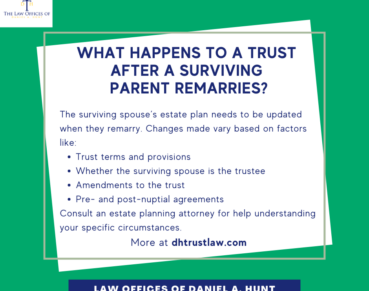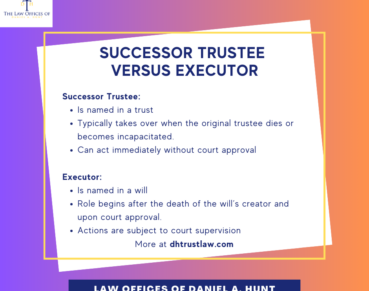What is (and is Not) a Will in the State of California?
Most Americans do not have an estate plan in place. Creating a last will and testament can seem overwhelming, and none of us likes to consider becoming incapacitated or passing away. If you are considering creating a last will and testament in California, you may be wondering what you need to do to make your will legally valid. California, like every other state, has specific legal requirements for what constitutes an enforceable will. We will discuss what is and what is not considered a valid will in the state of California.
Verbal or Video Recorded Statements Cannot Constitute a Will in California
Under California law, a will must be in writing. If you have an oral or video statement of how you would like your property to be distributed after you pass away, this is not considered a legally valid will. You must type or handwrite your will on paper for it to be valid in California. Sometimes people want to make changes to their will without recreating their entire will. They may cross out a section of the will and hand-write an addendum on the side. Any handwritten changes to your will could put you at risk of someone contesting the document. If you need to make changes to your will, we recommend speaking with an estate planning lawyer.
Witnesses Must Sign the Last Will and Testament
Every will must be witnessed by at least two people over the age of 18. The two witnesses you choose must be present when you sign your will or acknowledge that you signed your will. They will need to sign an affidavit confirming that you were of a sound mind when you signed your last will and testament. When two witnesses do not sign a will, the court will not enforce the will unless it meets the requirements of a holographic will, which we will discuss below.
The Last Will and Testament Must Declare Beneficiaries
The purpose of creating a last will and testament is to provide instructions to the probate court on how to distribute your property. Under California law, you can give your assets to any business, non-profit organization, or individual you choose. There is no rule regarding how you must divide up your assets or to whom you give your assets. You can distribute your assets in any way you prefer. You may give all your assets to a charity or divide your assets among multiple relatives.
However, you must clearly state how you would like your assets to be distributed. Your will should use clear language stating which assets should be received by which people or organizations. If your will is too vague, family members can challenge it. The more precise your language, the less likely it will be challenged successfully in probate court.
Unfortunately, we have seen many handwritten wills that are not thorough enough, creating conflict during the probate process. When you write a clear will, you will make it harder for relatives to challenge the terms of the will because your intentions will be crystal clear. One of the best ways to ensure your will includes precise language is to work with an attorney. Your estate planning attorney will make sure the probate court understands how you want your property to be distributed after your death.
Can a Will be Typewritten?
Yes, in California, a will can be either typewritten or handwritten. However, we recommend typing your will so that there are no questions about what you intended to write. Sometimes handwriting can be challenging to read, and when you type a will, there will be no question about the words on the page. If you do hand-write your will, you will still need to sign it.
Are Handwritten Wills Valid in California?
Sometimes, people are surprised to learn that a testator’s handwritten will is still legally valid in California. These types of wills are called holographic wills. Holographic wills do not need to be witnessed by two adults over the age of 18. Instead, the testator only needs to handwrite the will and sign it himself or herself. There are other additional requirements for a holographic will to be valid in California, such:
- It must be clear that the testator who wrote the will intended the document to serve as their will
- The testator must have had testamentary capacity and been of a sound mind when he or she drafted the holographic will
- The handwriting on the document must be the testator’s
- The signature on the document must belong to the testator
California recognizes holographic wills because they understand that in some cases, writing out a holographic will may be necessary. For example, when someone is involved in an emergency situation, such as a car accident, and they feel they may not live much longer, they can write out a will on a scrap piece of paper and sign it quickly. Unfortunately, holographic wills are harder to defend against legal challenges. For example, suppose a deceased individual’s spouse or child would have inherited everything under California intestacy laws and chooses to contest a holographic will that says otherwise.
A friend of the deceased may provide the probate court with a holographic will stating that the friend should inherit everything from the deceased individual. The spouse who would have inherited had there not been a will may challenge the holographic will and claim it is not valid and that they should inherit all of the assets. It is wise to work with an attorney to create a typed last will and testament signed and witnessed by two adults. Doing so will decrease the chances of estate litigation.
Contact a Sacramento Will Lawyer Today
Are you concerned that your will may not be legally valid in California? If so, we recommend speaking to an experienced California estate planning lawyer. Your last will and testament is among the most important legal documents you will create in your lifetime. Do not take risks with your estate. Contact today to schedule your free initial consultation.
Law Offices of Daniel A. Hunt
The Law Offices of Daniel A. Hunt is a California law firm specializing in Estate Planning; Trust Administration & Litigation; Probate; and Conservatorships. We've helped over 10,000 clients find peace of mind. We serve clients throughout the greater Sacramento region and the state of California.




